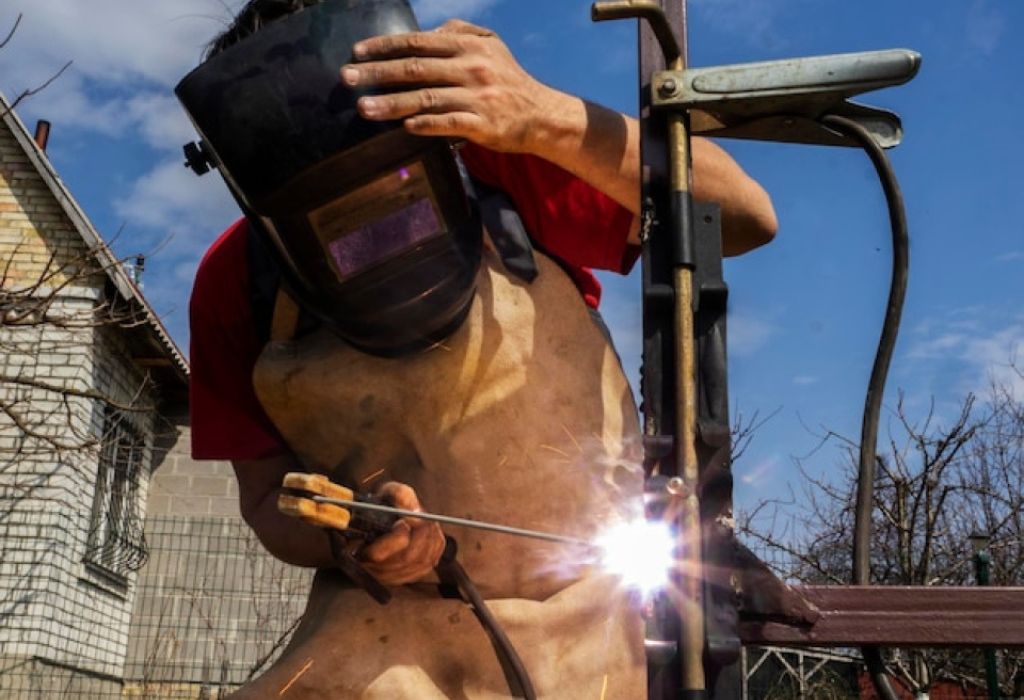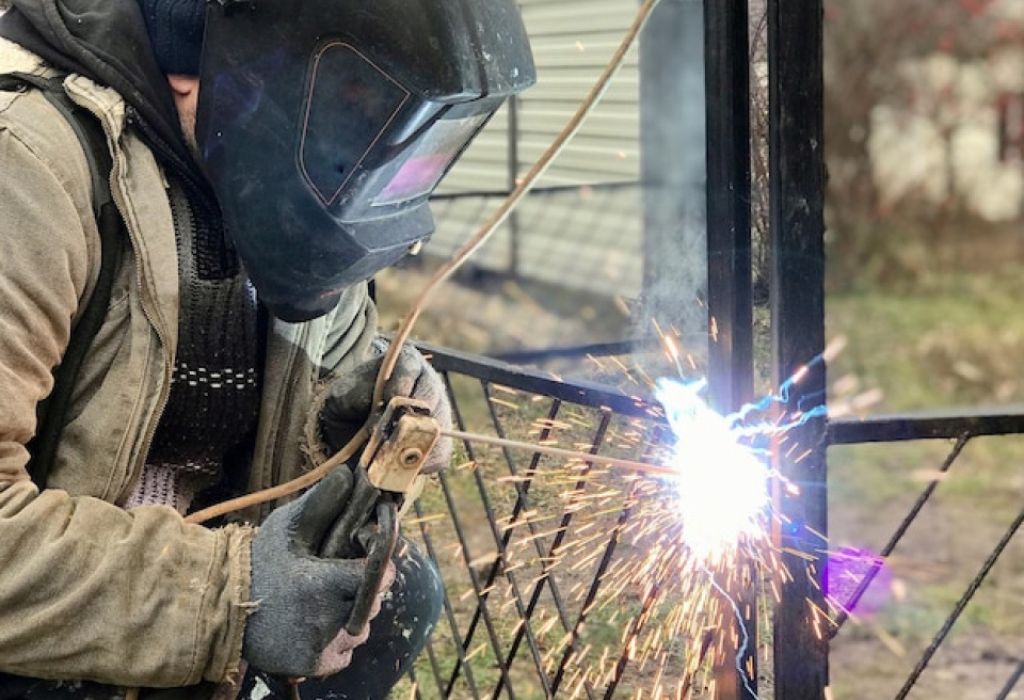Picture standing near a construction site where sparks fly as metal pieces fuse together.
The person behind the mask is a welder, shaping infrastructure and machinery that society depends on daily.
Welding looks powerful and rewarding, but many wonder if pursuing it as a career is truly worth it.
The appeal is clear. Welding offers hands-on work, steady demand, and opportunities across industries from automotive to aerospace.
Yet the trade also comes with challenges like long hours, physical strain, and safety risks.
These realities raise an important question: is becoming a welder worth it in today’s job market?
One reason many explore welding is salary. According to the U.S. Bureau of Labor Statistics, the average welder earns about $47,540 per year (BLS).
Some specialties, like underwater or pipeline welding, pay significantly higher, often crossing six figures. Pay potential varies, but skilled welders remain among the better-paid tradespeople.
Job security is another factor to consider. Projections show more than 42,000 welding openings annually through 2032 (BLS), driven by infrastructure projects, energy demand, and manufacturing growth.
Unlike many jobs threatened by automation, welding requires precision and adaptability, making skilled professionals difficult to replace.
Still, the trade is not for everyone. The physical demands, exposure to heat, and safety requirements are part of daily reality.
To decide if welding is the right path, it’s essential to weigh salary, job outlook, pros and cons, and long-term opportunities.
This guide explores those questions in detail, helping determine whether a welding career truly pays off in both financial and personal value.
What Does a Welder Do?

Welders are skilled tradespeople who use heat and tools to join pieces of metal together. Their work is essential in construction, manufacturing, shipbuilding, and even aerospace industries.
The role is not limited to one type of welding. Methods such as MIG, TIG, Stick, and Arc welding are commonly used, each suited for specific tasks. Pipe welding and specialized techniques allow welders to work in demanding fields like energy and infrastructure.
A welder’s job is both technical and physical. It requires steady hands, precision, and a strong understanding of materials. The outcome of their work can be anything from a car frame to a bridge or aircraft component.
What are the main duties of a welder?
The primary duties include joining, repairing, and fabricating metal structures.
What industries employ welders?
Industries such as construction, manufacturing, automotive, aerospace, and oil and gas employ welders.
Do welders work indoors or outdoors?
They can work in both environments depending on the project and industry.
Is welding considered skilled trade work?
Yes, welding is a skilled trade requiring specialized training and certifications.
Can welding be self-employed work?
Yes, many welders become independent contractors or run small businesses.
Welder Salary: How Much Can You Earn?
One of the biggest factors in deciding if becoming a welder is worth it is salary. Welding offers competitive pay, especially for those with advanced skills and certifications. According to the U.S. Bureau of Labor Statistics, the average welder earns about $47,540 per year in the United States.
Earnings can vary depending on location, industry, and specialization. Welders in industries like aerospace, energy, and pipeline work often make significantly higher salaries than general construction welders.
Entry-level welders typically start with modest pay, but income rises quickly with experience. Specialized welding positions, such as underwater welding, can even reach six-figure annual incomes. Overtime is also common, allowing welders to boost earnings further.
What is the average salary of a welder?
The average annual salary is about $47,000 in the United States.
Which welding jobs pay the most?
High-paying roles include underwater welding, pipeline welding, and aerospace welding.
Do welders earn more with certifications?
Yes, certifications in advanced methods significantly increase earning potential.
Can welders earn overtime pay?
Yes, overtime is common and can substantially increase annual income.
Are welding salaries increasing?
Yes, wages are rising due to strong demand for skilled tradespeople.
Job Outlook: Is Welding in Demand?
The job outlook for welders remains strong, with steady opportunities across industries. According to the U.S. Bureau of Labor Statistics, more than 42,000 welding openings are projected annually through 2032. This demand is fueled by infrastructure projects, energy production, and manufacturing needs.
Welding is also less vulnerable to automation compared to other trades. Robots can handle repetitive welding tasks, but human welders are still needed for precision work, complex environments, and problem-solving.
Geography plays a role in demand. Regions with active construction, shipyards, and oil and gas operations have higher employment opportunities. Globally, welders continue to be sought after in industries from aerospace to renewable energy.
Is welding a growing career field?
Yes, welding is projected to remain stable with thousands of openings each year.
Will welding be replaced by robots?
Not entirely, as many welding jobs require skill, adaptability, and human oversight.
Where is welding most in demand?
Industries like construction, energy, shipbuilding, and manufacturing rely heavily on welders.
Are welding jobs recession-proof?
Relatively, since welding supports critical infrastructure and essential projects.
Is welding a global career opportunity?
Yes, welders are in demand worldwide, creating opportunities for travel and international work.
Pros of Becoming a Welder
Welding is an attractive career for people who prefer hands-on work over office jobs. It provides the chance to create, build, and see tangible results from each project.
One major advantage is accessibility. Becoming a welder does not require a four-year college degree, making it a practical path for those who want to start earning quickly. Training programs are often short and affordable compared to other career routes.
Welders are in high demand across industries. From construction and manufacturing to aerospace and energy, welding skills transfer to a wide range of fields. This creates job security and career flexibility.
The potential for career advancement is another benefit. Experienced welders can move into inspection roles, management, or teaching. Some even start their own welding businesses, gaining independence and higher earning potential.
Why is welding a good career?
It offers stability, strong demand, and a clear path to financial independence.
Do welders have job security?
Yes, skilled welders remain in demand across multiple industries.
Can welding provide career advancement?
Yes, opportunities exist to advance into supervisory, inspection, or business ownership roles.
Is welding rewarding work?
Yes, welders often take pride in building essential structures and products.
Does welding allow travel opportunities?
Yes, especially in fields like pipeline welding and shipbuilding, which often require travel.
Cons of Becoming a Welder
Welding can be physically demanding. Long hours on your feet, repetitive movements, and handling heavy equipment can strain the body over time.
Another drawback is safety risk. Welders work with intense heat, sparks, and fumes, which can cause burns, respiratory problems, or eye damage if proper protection is not used.
Work conditions are not always comfortable. Many welding jobs involve high temperatures, confined spaces, or outdoor environments with weather challenges.
The schedule can also be demanding. Some industries require long shifts, overnight projects, or frequent travel to job sites. While this creates opportunity, it can also disrupt work-life balance.
Is welding dangerous?
Yes, without proper protective gear, welding exposes workers to burns, fumes, and eye injuries.
Does welding require physical strength?
Yes, it often involves heavy lifting, awkward positions, and long hours of physical effort.
Do welders face health risks?
Yes, risks include respiratory issues from fumes and strain injuries from repetitive work.
Are welding jobs stressful?
Some can be, especially when deadlines are tight or conditions are harsh.
Does welding require relocation?
Sometimes, depending on industry demand and project locations.
Education and Training Requirements

Welding is a skilled trade, but it does not require a traditional four-year college degree. Most welders enter the field through trade schools, technical colleges, or apprenticeships. These programs are designed to provide both hands-on training and theoretical knowledge.
Training lengths vary. Some certificate programs take as little as six months, while more advanced courses can last up to two years. Apprenticeships often combine paid work with classroom learning, giving new welders practical experience while earning income.
Certifications play a critical role in welding careers. The American Welding Society (AWS) and other organizations offer specialized credentials that can significantly increase earning potential and job opportunities. Employers often prefer certified welders for complex or high-paying jobs.
The cost of training is relatively affordable compared to university degrees. Tuition for welding programs typically ranges from $5,000 to $15,000, depending on the school and level of specialization.
Do you need a degree to become a welder?
No, trade school, apprenticeship, or certification is usually enough.
How long does welding training take?
Between six months and two years, depending on the program.
Are welding certifications important?
Yes, certifications are often required for higher-paying or specialized jobs.
What is the cost of welding school?
Most programs range from $5,000 to $15,000 depending on location and specialization.
Can welding be learned on the job?
Yes, but formal training and certification improve career opportunities and pay.
Future of Welding Careers
The future of welding looks promising as industries continue to rely on skilled trades. Infrastructure projects, renewable energy, and manufacturing will all drive demand for experienced welders.
Automation is entering the welding field, but it cannot replace human workers entirely. Robots handle repetitive tasks, while human welders are needed for precision, problem-solving, and adapting to unique job conditions. This balance makes welding a secure career for years to come.
Renewable energy is creating new opportunities. Wind turbines, solar panel supports, and green infrastructure projects require welding expertise, adding to traditional demand in construction and manufacturing.
International demand is also strong. Certified welders often find opportunities abroad, especially in regions investing heavily in energy and large-scale infrastructure.
Will automation replace welders?
No, while robots assist, human welders are needed for complex and adaptive tasks.
Is welding relevant in renewable energy?
Yes, projects like wind farms and solar plants depend on skilled welders.
Are welders needed overseas?
Yes, welders are in demand globally across multiple industries.
What is the future job security of welding?
Welding offers strong long-term security due to essential industry reliance.
Can welders shift to inspection or engineering roles?
Yes, with experience and training, welders can advance into inspection, supervision, or engineering positions.
Conclusion
Welding continues to stand out as a practical and rewarding career path. It offers strong salaries, consistent demand, and opportunities in industries ranging from construction to renewable energy.
The career is not without challenges. Physical strain, safety risks, and demanding conditions are part of the trade. However, for those who value hands-on work and job stability, welding provides a secure future.
Training requirements are accessible and affordable compared to traditional degrees. Certifications open the door to higher-paying roles, and global opportunities make welding a versatile profession.
With infrastructure growth and renewable energy projects on the rise, welders will remain in high demand. The profession adapts alongside technology while still requiring human expertise.
For individuals seeking a stable career with growth potential, the evidence is clear: becoming a welder can be worth it. The key is proper training, safety awareness, and a commitment to building a long-term path in the skilled trades.

I’m Darrell Julian, the founder, lead writer, and hands-on welding enthusiast behind ArcWeldingPro.com. With more than 15 years of real-world welding experience, I created this platform to share what I’ve learned in the field, in the shop, and in the heat of the arc.


